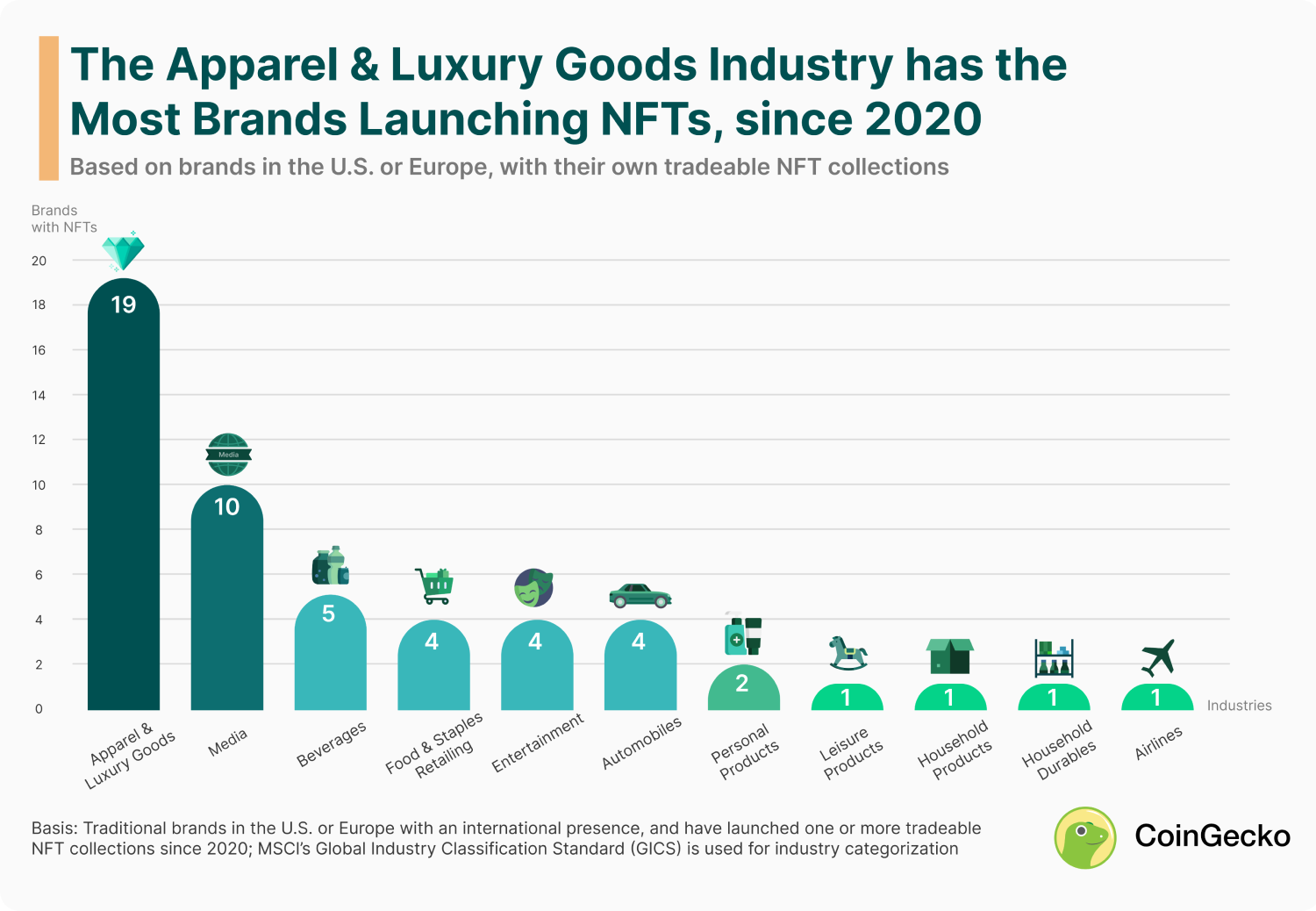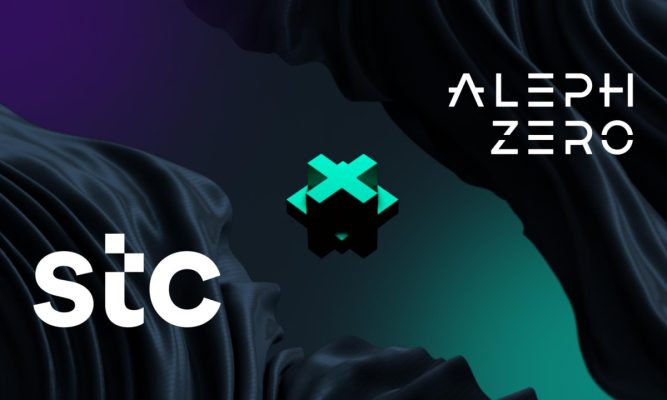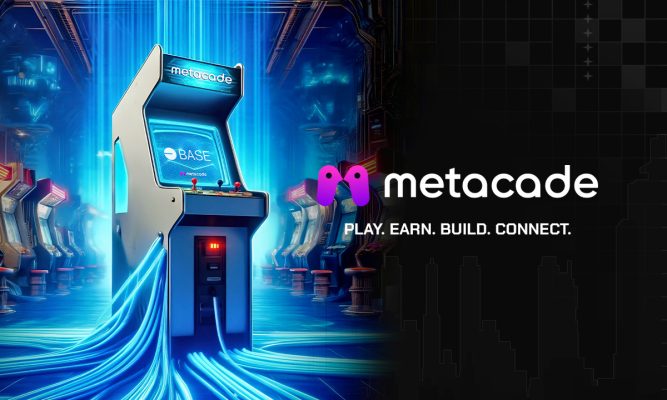It is no news that NFTs are extremely popular among crypto enthusiasts. And although we are currently experiencing a bear market, many traditional brands are leveraging NFTs in their marketing efforts to engage their audience.
However, when thinking of the most NFT-involved brands, some industries dominate this topic.
In this matter, CoinGecko conducted a study in which the brands are categorized by MSCI’s globally recognized GICS (Global Industry Classification Standard) to identify the industry with the greatest number of brands launching NFT collections, considering brands from the U.S. and Europe.

And as the research shows, the Apparel and Luxury Goods industry has the greatest number of brands launching Non-Fungible Token (NFT) collections since 2020.
NFTs in Apparel & Luxury Goods
During the past two years, 52 traditional brands launched their tradeable NFT collections. And out of these brands, 19 are from the Apparel and Luxury Goods industry. Indeed, it is a surprising number, considering that adding NFTs to a marketing strategy is quite a recent practice. Many businesses still do not use it, as they may find it risky or less profitable.
However, they would undoubtedly change their mind when discovering that Adidas, which fronts this sector, launched an NFT collection called “Adidas Originals into the Metaverse,” which has a total trading volume of 47,000 ETH to date since December 2021, when it was launched. This trading volume currently exceeds $60 million, and no brand would ignore this amount.
Nike, Dolce & Gabbana, and Gucci launched their NFT collections and have remarkable trading volumes, too. For instance, Nike’s collection, RTFKT x Nike Dunk Genesis CRYPTOKICKS, has a total trading volume of approximately 8,000 ETH (more than $10 million).
The newcomers to the NFT party in the Apparel and Luxury Goods industry are Puma, with Nitro Token and Nitropass, and Tiffany & Co, with NFTiff. All three NFT collections were launched in August 2022.
Other brands that launched NFT collections include Playboy, Givenchy, Burberry, Louis Vuitton, and Prada.
The main advantage of including NFTs in a marketing strategy is that it can help brands get more online visibility through new technologies. In what concerns luxury brands, their main goal is to create unique items. Non-Fungible Tokens (NFTs) are, by definition, unique; thus, brands will maintain their core principles while also offering customers new ways of owning the brand’s products.
The Media Industry and Non-Fungible Tokens
The Media industry certainly knows how to build bright marketing strategies, but not so many brands include NFTs in their plans. Although Media took second place in CoinGecko’s research, there are only 10 brands that decided to create their own NFT collections. Summing up 19% of the total number of NFT sellers among traditional industries, Media still has a long way to go until users see it as NFT-involved.
In the Media industry, the first place was taken by Time USA, with the TIMEPieces NFT collection. The brand is totally entitled to be placed first, as its collection has a total trading volume of 10,648 ETH ($13.6 million).
Among the companies that created NFT collections in the Media industry, we can find Fortune, Reddit, Rolling Stone, and Fox Corp.
Other Industries
Out of 24 GICS industries, CoinGecko found 11 that have experimented with launching NFTs, and besides Apparel & Luxury Goods and Media, others started their NFT journey, too.
For instance, one of the most popular NFT activities in the Food & Staples Retailing industry is Flyfish Club, a restaurant from New York City that is considered the world’s first members-only private dining club. To become members, users have to purchase a Flyfish Club NFT. Holding one collectible will also give access to various real-life pop-up events or sushi-themed NFT food.
When talking about the Beverage industry, Glenfiddich was the first brand to create an NFT collection. Partnering with BlockBar, an NFT marketplace, Glenfiddich created 15 NFTs consisting of digital images of 1973 Scotch whiskey bottles. The NFTs were sold with their real-life counterparts.
Besides the industries mentioned above, CoinGecko discovered that NFTs made their way into others, too. Entertainment and Automobiles have 4 NFT-involved brands each, and 2 companies from the Personal Products industry launched NFT collections. Industries such as Leisure Products, Household Products, Household Durables, and Airlines stand at one brand each.
After the research was completed, Bobby Ong, COO and co-founder of CoinGecko, commented: “In spite of current bear market conditions, many of these ‘traditional’ companies are leveraging NFTs in their brand and marketing efforts as a way to engage their audience and communities. It will be interesting to see how this trend holds up next year – and if brands in industries outside this list unlock NFTs in their marketing strategies.”
About the Methodology
CoinGecko’s research focused on traditional brands that have launched tradeable NFT collections since 2020, either independently or with a partner. To identify the industry with the greatest number of brands launching NFT collections, CoinGecko categorized the companies according to MSCI’s Global Industry Classification Standard (GICS).
During the research, companies were named ‘traditional’ brands, as their work is not primarily related to the cryptocurrency or the NFT industries. Furthermore, the companies reviewed in the study are headquartered in the United States or Europe, with a presence in at least one other geographical market.
CoinGecko’s research excluded brands that indirectly ride on or passively endorse other NFT collections and companies that launched a 1/1 NFT. The research does not consider non-tradeable NFTs and those that have never been traded or have no trading volume. Another category not included is the utility NFTs launched by brands, such as event tickets.
While conducting the research, CoinGecko considered the total trading volume across all collections when reviewing brands with multiple NFT launches. Moreover, the Textiles, Apparel, and Luxury Goods industry has been shortened to Apparel and Luxury Goods for clarity of communication.
In Conclusion
While NFTs are increasing in popularity, traditional brands have started to launch their own NFT collections, and CoinGecko explained everything in its latest research.
Out of the 52 brands reviewed, the Apparel and Luxury Goods industry is ranked first in CoinGecko’s top, with 36% of the total number of NFT collections launched since 2020. Media follows with 19%, while the other industries share the rest of 45%.
While there are 24 GICS (Global Industry Classification Standard) industries, only 11 of them were found to have experimented with launching NFTs. Considering the current bear market conditions, CoinGecko’s COO and co-founder, Bobby Ong, stated that it is to be seen if there will be more brands including NFTs in their marketing strategies.

